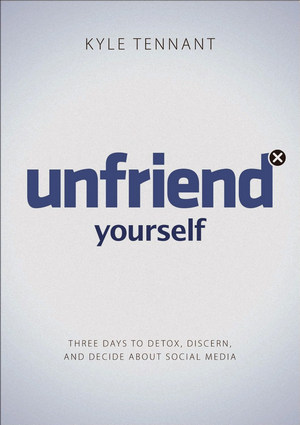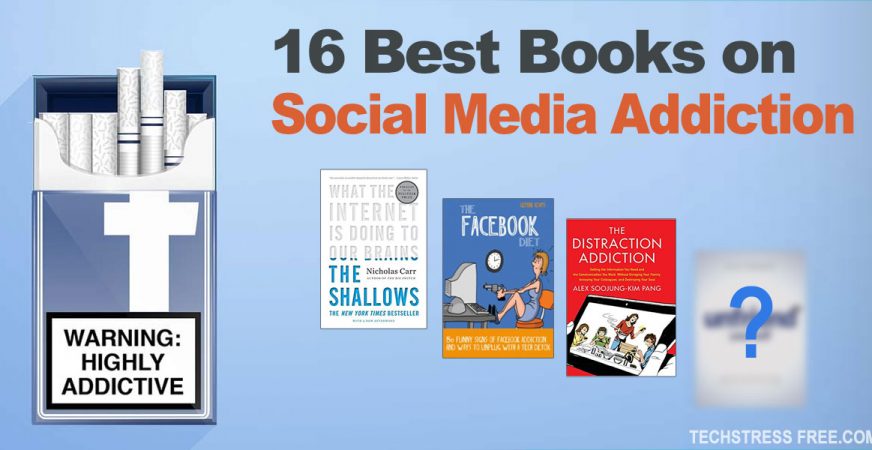
17 Best Books on Social Media Addiction
Are we becoming slaves to the internet and forgetting what matters most in life? If there was no internet, would we be better humans? How has social media affected socialization and our ability to think, and how can we break free from that?
The following books answer these and other questions in that line. They are nuggets leading you to break the chains of the internet and social media addiction, focus on making yourself a better person, grow closer to your loved ones, increase your concentration, and discover life in a new perspective.
Understand Social Media Addiction
You never know you are addicted to social media until it is late. You spend more time on social sites than you spend doing other things. You cannot spend a few minutes without your phone.
You develop virtual friends and tell yourself that socialization online is as better as face-to-face relationships. You paint your image online while destroying your real image, and you live for the moment you will touch your phone and get online. It is universal, you need to realize it to start rectifying it. If you cannot eat without using your phone, or you sleep late looking at profile pictures on social media, these books are for you.
The Little Book of Big Change, The Shallows, Amy Johnson PhD
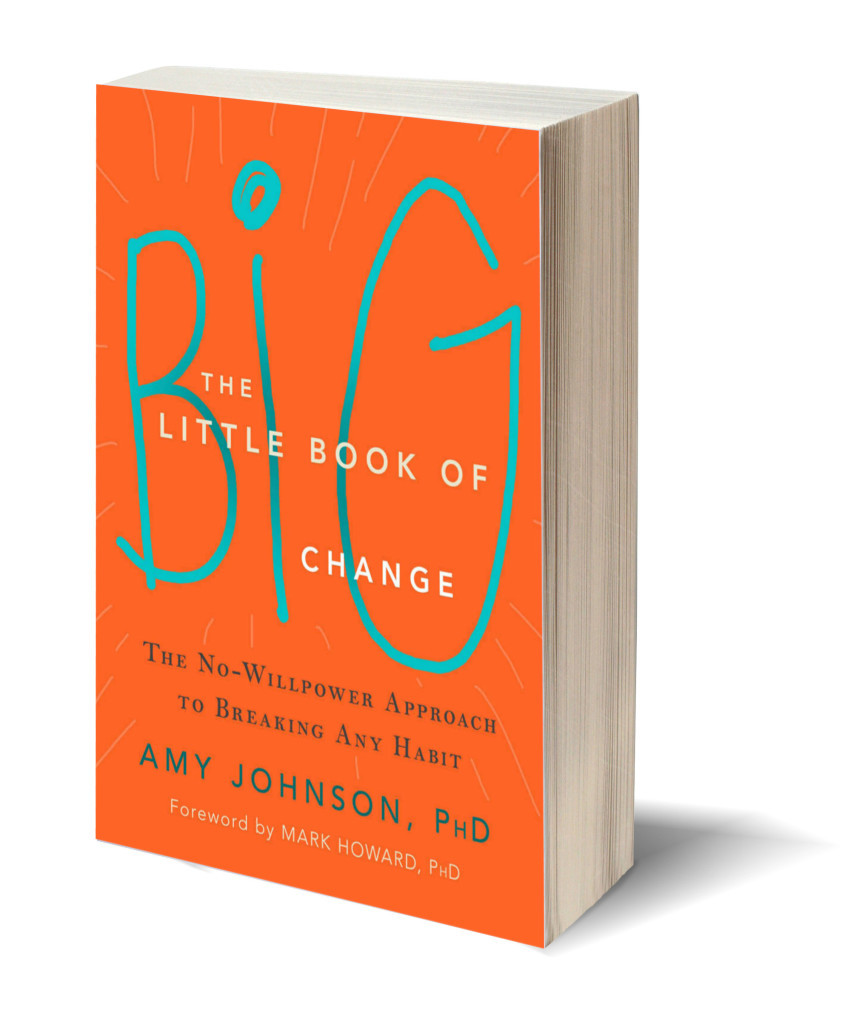 This book is based on the same paradigm shift we explore on this website. Highly recommended.
This book is based on the same paradigm shift we explore on this website. Highly recommended.
Little changes can make a big, big difference! In The Little Book of Big Change, psychologist Amy Johnson shows you how to rewire your brain and overcome your bad habits—once and for all.
No matter what your bad habit is, you have the power to change it. Drawing on a powerful combination of neuroscience and spirituality, this book will show you that you are not your habits. Rather, your habits and addictions are the results of simple brain wiring that is easily reversed. By learning to stop bad habits at the source, you will take charge of your habits and addictions for good.
Find it here »
The Shallows, Nicholas Carr
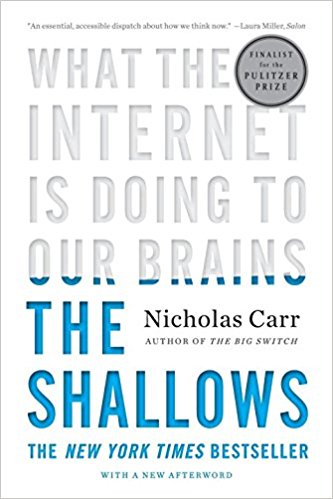 When Nicholas Carr posed the question on whether Google is making us stupid in Atlantic Monthly, he spurred a heated discussion on the effects that the internet is having on our brains. His point was that even as we enjoy the immense benefits that the internet has brought, we are losing our concentration and our ability to read and think.
When Nicholas Carr posed the question on whether Google is making us stupid in Atlantic Monthly, he spurred a heated discussion on the effects that the internet is having on our brains. His point was that even as we enjoy the immense benefits that the internet has brought, we are losing our concentration and our ability to read and think.
In his book, The Shallows, Carr explores the cultural and intellectual repercussions of the internet. He accounts the progress of the human brain over the years, from learning the alphabets to discoveries in neuroscience. He builds a compelling argument sighting Plato and McLuhan among other men of intellect. He shows how our attention and creative thinking was shaped by the printed book. In contrast, the internet encourages skimming and scanning and sampling information from hundreds of sources.
This book has been reviewed by Newsweek, The Journal, New York Times, San Francisco Chronicle and Financial Times among other authority magazines.
Find it here »
Hands Free Mama, Rachel Macy Stafford
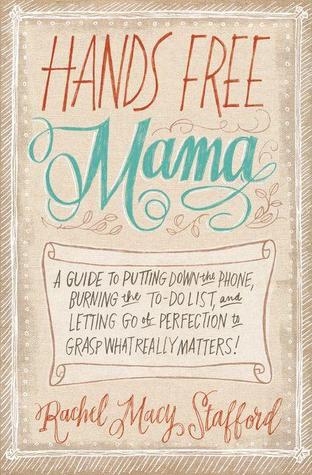 Rachel Macy Stafford, a special education teacher, could not stand the wreckage left by the internet and multi-tasking. According to her, while the internet poses as the new addiction, multi-tasking poses as the new marching order. She has proven this a thousand times in her book, Hand Free Mama.
Rachel Macy Stafford, a special education teacher, could not stand the wreckage left by the internet and multi-tasking. According to her, while the internet poses as the new addiction, multi-tasking poses as the new marching order. She has proven this a thousand times in her book, Hand Free Mama.
As the book byline goes, it is a guide to letting go of your phone and grueling schedules and focusing all attention on what matters in life. She observes that a balance has to be crafted between the perfection-obsessed world and media saturated world, our families and private lives.
It is neither a guide to giving up technology and social media in entirety, nor quitting our jobs, but a guide of utilizing the little moment that our schedules accord us to engage in real, meaningful interactions, Free from social media addiction. We love this book. It’s about making memories.
Find it here »
Unfriend Yourself, Kyle Tennant
Kyle challenges the readers to take three days with no Facebook, no Twitter or any other social media interaction. In his words, take this time to “detox,” discern and decide. He wrote this book in a Christian perspective, as a guide to helping you evaluate your use of social media and the internet. What does publicizing yourself do to your humanity? What difference will it make when you engage more in face-to-face interactions and give up social media? Is social media ruling you?
Kyle Tennant, Village Church Director of Student Ministries, broaches the topics of social media addiction, interactions and Godliness in a thought provoking way without raising emotional and spiritual arguments. He helps all understand the use of social media, critically think it through, and make a decision on whether to stay or leave.
Find it here »
The Facebook Diet, Gemini Adams
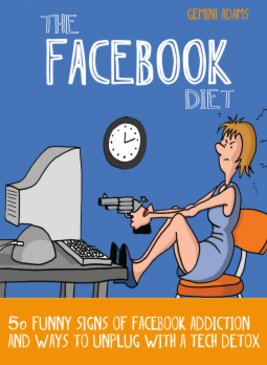 Are you spending a little too much time on Facebook? Do you suffer from social media addiction? Perhaps, what you need is a Facebook Diet. Award winning author, Gemini Adams, completes the phrase, ‘you know you are addicted to Facebook when…’ in 50 hilarious cartoons. It is a book penned to show a Facebook addict a glimpse into what their lives look like.
Are you spending a little too much time on Facebook? Do you suffer from social media addiction? Perhaps, what you need is a Facebook Diet. Award winning author, Gemini Adams, completes the phrase, ‘you know you are addicted to Facebook when…’ in 50 hilarious cartoons. It is a book penned to show a Facebook addict a glimpse into what their lives look like.
Adams observes that with over 1 billion people now on Facebook, and with more than 30 percent of that lot checking in on their timelines the first thing in the morning, there is danger lurking in our socialization. He offers cackling and thought provoking digital detox tips on ways to unplug from the shackles of Facebook. You will love how simply and funnily he puts it.
Find it here »
Facehooked, Dr. Suzana E. Flores
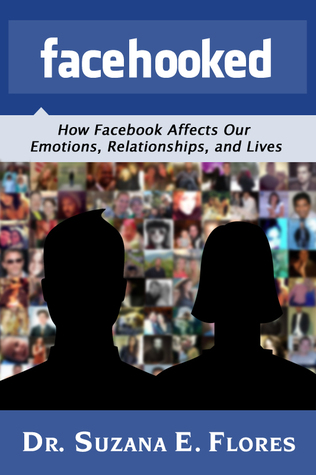 This book is simply unputdownable. Its timing and the social media research presented in a concise and easy flowing manner comes handy today more than ever before. It is about how social media, especially Facebook, is wrecking our daily lives. According to Dr. Suzana E. Flores, a psychologist, the social structure of our relationships, our self-awareness and our behaviors have been deeply affected by social media.
This book is simply unputdownable. Its timing and the social media research presented in a concise and easy flowing manner comes handy today more than ever before. It is about how social media, especially Facebook, is wrecking our daily lives. According to Dr. Suzana E. Flores, a psychologist, the social structure of our relationships, our self-awareness and our behaviors have been deeply affected by social media.
Facehooked looks at the eight grave problems that Facebook has put us into. These include peer pressure, self-esteem, stalking, emotional manipulation, and more. The book explores ways to identify the problems and offers tools and activities to tackle the menace.
Find it here »
The Big Disconnect, Catherine Steiner-Adair with Teresa H. Baker
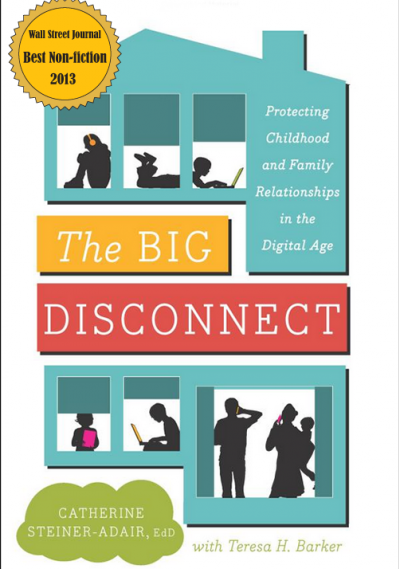 Perhaps you can feel that connections in families are breaking loose, we can feel it. Everyone is on their iPads, on Facebook even during meal times. Catherine and Teresa explore how the digital age has taken a toll on childhood and family relationships and how to stay together as a family.
Perhaps you can feel that connections in families are breaking loose, we can feel it. Everyone is on their iPads, on Facebook even during meal times. Catherine and Teresa explore how the digital age has taken a toll on childhood and family relationships and how to stay together as a family.
The book observes that children are always chatting on messaging platforms, parents are working online round the clock, and life has had a great transformation. It offers practical and easy to follow guidelines on creating the rapport in families. Drawing from real life stories, Catherine, a clinical psychologist, uses her experience to paint a picture of how interactions in families have been affected, and how children direly need the adults in their lives. It’s a good read.
Find it here »
Wired Child, Richard Freed
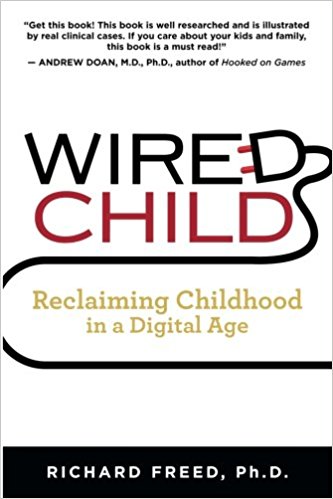 This book presents you the tools to save your children from technological myths; that technology positively impacts our children. Richard Freed, a child and adolescent psychologist, observes that while there are promises of immense learning opportunities online, children are retreating to the entertaining aspect of the internet, video games and texting, and social media.
This book presents you the tools to save your children from technological myths; that technology positively impacts our children. Richard Freed, a child and adolescent psychologist, observes that while there are promises of immense learning opportunities online, children are retreating to the entertaining aspect of the internet, video games and texting, and social media.
In Wired Child, Richard reveals how destructive technology myths are robbing kids the childhood they need. He observes that teens are spending an average of eight hours each day in front of screens. And this is pushing them away from family and school. The book is well illustrated with Richard drawing from his experience dealing with teens. You will love it if you need to save your family in the digital age.
Find it here »
Confessions From The Comments Section, Jonathan Kieran
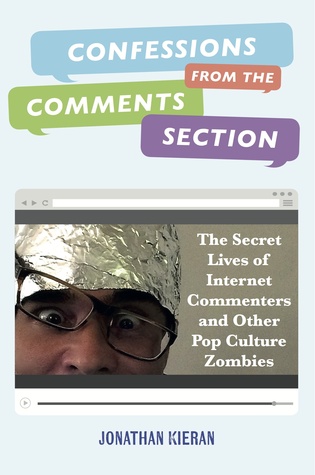
Jonathan Kieran is a humorist on top of being a writer and illustrator. We love reading humorists, and you cannot read Jonathan and not laugh. In Confessions From The Comments Section, Jonathan illustrates how the internet is leading the compact majority to seek for attention by offering opinions. The zombies, as he calls them to stand behind fake avatars and usernames and engage in a battle between the intellects and the stupid. Here, Jonathan brings to light 33 types of commenters on the internet.
In a humorous yet insightful way, he presents the topics of celebrity obsession, narcissism, and religious hypocrisy. What you post online today will be visible years to come. This book offers you a guide on what not to do online while exercising your freedom of speech.
Find it here »
Defriending Facebook, Rachel Ruff
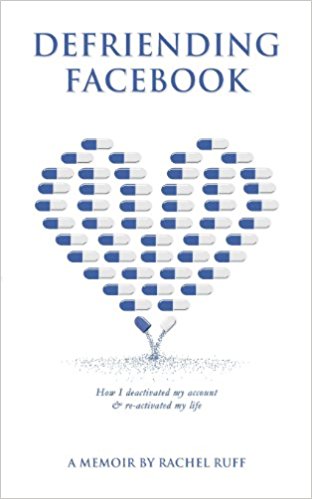
It is until you read Rachel Ruff that you become aware of social media demons. Rachel is an award-winning CNN producer who once served as the Vice President of Porter Novelli in Washington DC. Quite successful in her career. You may wonder how such a successful woman ended up being a puppet of Facebook and nearly ruining her entire life.
In Defriending Facebook, a memoir, Rachel recounts how she almost destroyed her self-image while trying to present a great life on Facebook. In those four years, she narrates how she almost lost her loved ones and nearly lost her life. You will empathize with her but you will also get a rude awakening.
Find it here »
Social Media Addiction, Caesar Lincoln
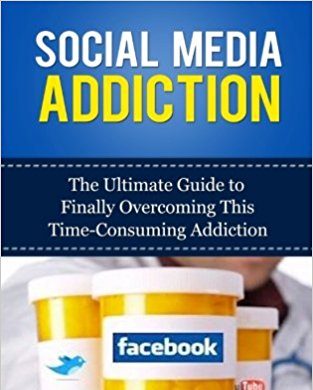
Almost everyone with an internet connection is on social media. But, only a few accept that social media addiction is real. The few who realize they have a problem do not know how to snap off it. In this book, Caesar Lincoln shows the magnitude of the effects of social media addiction on our lives, signs that you are deeply addicted to it, the positives and negatives of social media, and how to overcome the pangs that social media has on you.
According to Caesar, social media robs you of time. You lose quality time that you would otherwise spend with family and friends.
Find it here »
Is It Safe To Friend a Dead Guy on Facebook? Steve Krupnik and Joe M. Ruiz
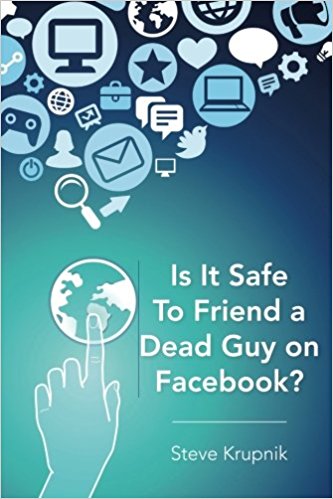
Another humorous book here that shows you just how much social media addiction is messing up your life and how to snap out. Steve and Joe combine their writing and illustration skills respectively to drag all social media addicts back to real life.
Steve observes that there is a bridge between the real world and human beings. People are living for the avatars and social media posts, the attention they get and all grub that trails behind social media personalities. This book comes as a dose to the social media addicts, assisting them to find a balance between the face-to-face relationships and the digital age. Steve, in a satirical way, paints the digital ‘junkies’ and shows how technology, especially social media, is advancing more than its users.
The combination of Steve’s writing and Joe’s illustrations create a punching, unique, and funny approach to the topic of social media. The book sounds controversial, but when you read the whole book, you will need a moment of thought. Steve is a business coach, and you can feel his wit.
Find it here »
Irresistible, Adam Alter
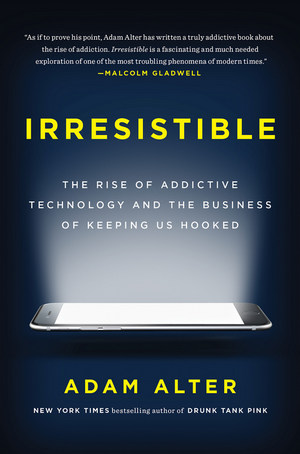
How much are you addicted to technology? How many times do you check your phone when reading a good book? Irresistible, by Adam Alter is an investigation into the reasons we keep scrolling and surfing. You will love how Adam articulates his arguments and how he presents his findings.
According to Adams, a New York University professor, half the number of people in the developed world are addicted to something. In most cases, this ‘something’ is not drugs but behavior. People are into social media addiction. People are checking their emails up to 36 times an hour, scrolling through social sites while having breakfast and gambling more than they used to.
While he accepts Facebook was fun when it was launched up to three years ago, Adam shows how fun has morphed into addiction. By reading this book, you will learn more about addiction. How you never realize that you are getting into it, its bottomlessness, and its immersive nature. Plus, your addiction is mobile, you carry it wherever you go.
There is a horde of problems associated with social media addiction, especially in developed countries. This book shows you all and helps you avoid them.
Find it here »
Reclaiming Conversation, Sherry Turkle
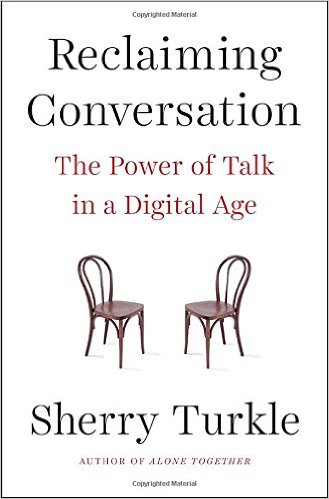
Jonathan Franzen in his article on New York Times, calls Sherry Turkle a ‘moderate among extremists.’ Sherry works first hand with computing engineers, but she is ever moderate on her interactions with technology, especially social media. In her earlier release, Alone Together, Sherry presents a report on how human relationships have been affected by technology and the digital age. When writing Reclaiming Conversation, Sherry observed the interactions between people and robots, and even interviewed them to get first-hand stats.
She observes that, at first, we replace human beings with robots and face-to-face conversations with texting, and claim that this is better than nothing. However, later we claim that the robots are better than anything. The virtual world is gradually overtaking the real.
In this book, Sherry draws from her experience with engineers and people obsessed with technology to save us from the shackles and pangs of living a virtual life.
Find it here »
The Distraction Addiction, Alex Soojung-Kim Pang
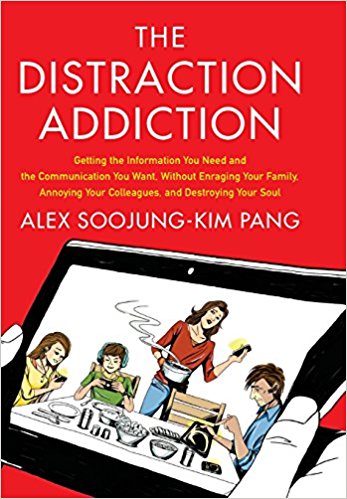
Alex Soojung-Kim Pang is a technology guru. In his opinion, people are busy today than they were five years ago. You wait with baited breath for Outlook to load, you check your social media page when cooking, and answer emails while eating. You prepare your kids for school while talking on the phone and watch TV for an hour longer than you intended. With all these, our attention span has gone low. Is there a way to reclaim our ‘real’ lives in this digital age? Alex says yes in his book, The Distraction Addiction.
This book outlines eight principles, drawing from Buddhists, to help those who are hopelessly addicted to technology. These principles seek to help you break from the addiction; find ways to multi-task without pissing your family away, enhance your concentration and craft a balance for your life.
Find it here »
Talking Back to Facebook, James P. Steyer
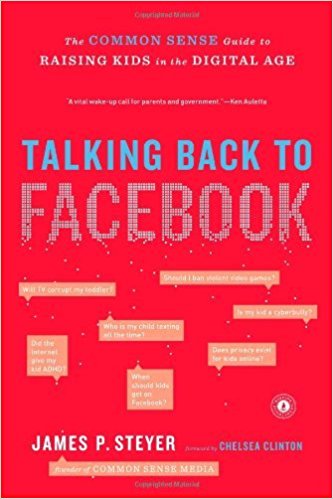
It is challenging to raise kids in this digital media age. Even those who have found success in it have battled challenges. James Steyer is the founder and CEO of Common Sense Media and a father of four. In his book, Talking Back to Facebook, Steyer gives straightforward advice to parents addressing what he calls RAP. These are pitfalls that come with children’s use of the internet.
While most of the advice you find online says you shield your kids from the internet completely, Jim offers tools to filter the content that children access online, and how to limit the time they spend online. Though the title suggests that the book addresses Facebook issues, it is more like a guide to navigate the overall digital world and raise kids without worry.
Jim is an advocate for kids, and you can feel his fatherly voice in his writing. He delivers the book in the form of his story, making it more interesting.
Find it here »
Facebook Addiction, Nnamdi Godson Osuagwu
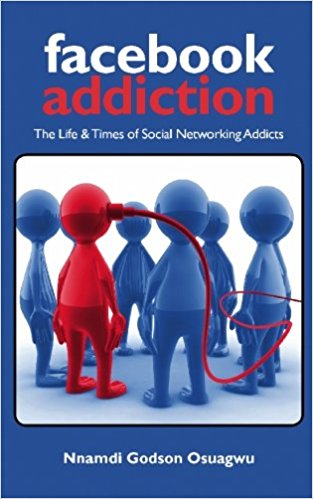
You never know when Facebook and other social media sites have their pangs on your back, but Facebook Addiction by Nnamdi Godson Osuagwu will get you wondering what Facebook is doing to you.
In this book, Nnamdi delivers his message in the form of a story, creating fictional characters to represent the everyday Facebook user.
He has collaborated with New York Daily News to show the extent to which our lives are wrecked by social media addiction. He compares substance addiction with internet addiction, showing an awakening reality on social networking culture.

